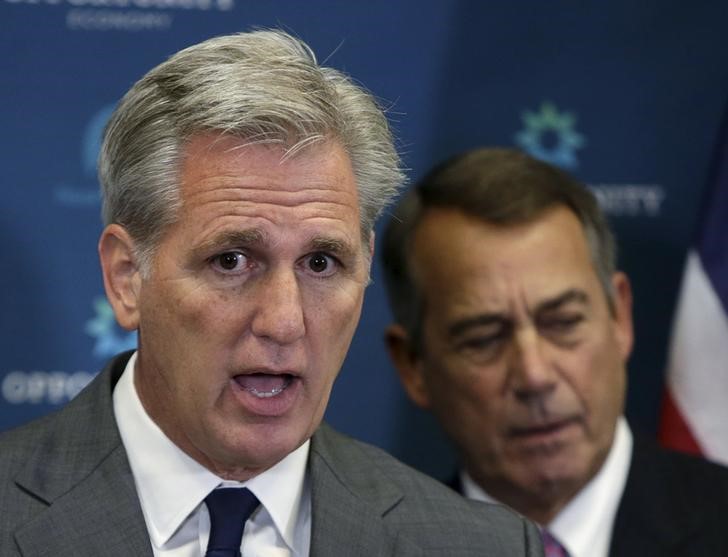By David Lawder and Susan Cornwell
WASHINGTON (Reuters) - U.S. House Majority Leader Kevin McCarthy appears to have locked up enough support among his fellow Republicans to be nominated for speaker, but has not nailed down the 218 votes needed to be elected by the full chamber, Republican lawmakers said on Wednesday.
House of Representatives Republicans are scheduled to cast secret ballots on Thursday on their choice to replace House Speaker John Boehner, who is resigning from Congress on Oct. 30.
McCarthy, currently the No. 2 House Republican, and the front-runner in the race, has two announced Republican opponents for the job - House Oversight Committee Chairman Jason Chaffetz of Utah and Representative Daniel Webster of Florida.
A group of around 40 of the most conservative House Republicans - enough to keep him from being elected speaker in a public vote - were largely still non-committal after a candidate forum on Tuesday.
The Freedom Caucus is expected to meet on Wednesday to decide which candidate to support.
"We have every intention of voting together tomorrow and on the house floor," said Representative Jim Jordan, the group's leader.
Some Freedom Caucus members said they would not support McCarthy, including Representative Tim Huelskamp of Kansas, who said he would likely vote for Webster.
"I don't think Kevin convinced anybody that he would be much different than John Boehner," Huelskamp said. "Right now it's just 'Trust me.'"
Boehner has scheduled a public vote for his replacement on Oct. 29.
"I am confident we will have a new speaker on that day," Boehner told reporters.
With 247 Republicans in the House, failure to win the 218 minimum needed for a Speaker to be elected would prove embarrassing for the party. A House Democratic leadership aide said Democrats would not help Republicans elect McCarthy and instead will vote for Democratic Minority Leader Nancy Pelosi, who served as speaker from 2007 until 2011.
Representative Mark Meadows, a North Carolina conservative who in July called for Boehner's ouster, said it was not likely that 218 votes could be reached on Thursday, but such a vote would be "unifying."
Another House conservative, Representative Walter Jones, said any candidate who has committed "misdeeds" that could embarrass the party should withdraw from leadership contests. But he did not name any specific concerns.

In a letter to party leaders, Jones recalled past personal controversies, such as the resignation of Speaker-elect Bob Livingston in 1998 after an extramarital affair became public.